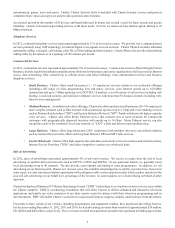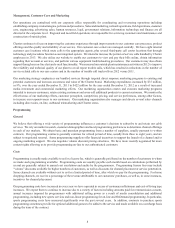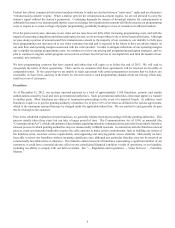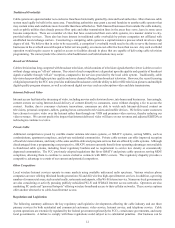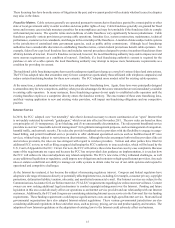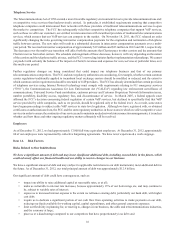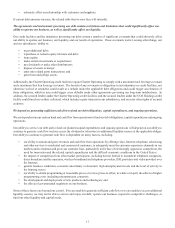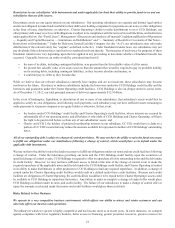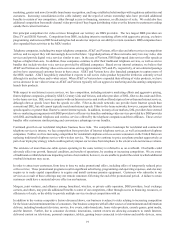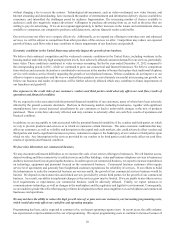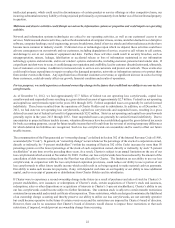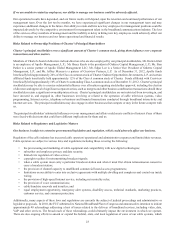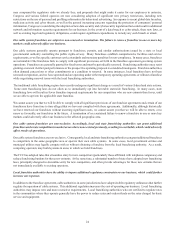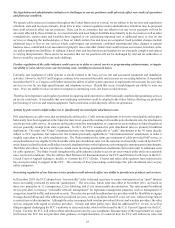Charter 2012 Annual Report Download - page 27
Download and view the complete annual report
Please find page 27 of the 2012 Charter annual report below. You can navigate through the pages in the report by either clicking on the pages listed below, or by using the keyword search tool below to find specific information within the annual report.15
These licensing fees have been the source of litigation in the past, and we cannot predict with certainty whether license fee disputes
may arise in the future.
Franchise Matters. Cable systems generally are operated pursuant to nonexclusive franchises granted by a municipality or other
state or local government entity in order to utilize and cross public rights-of-way. Cable franchises generally are granted for fixed
terms and in many cases include monetary penalties for noncompliance and may be terminable if the franchisee fails to comply
with material provisions. The specific terms and conditions of cable franchises vary significantly between jurisdictions. Cable
franchises generally contain provisions governing cable operations, franchise fees, system construction, maintenance, technical
performance, customer service standards, and changes in the ownership of the franchisee. A number of states subject cable systems
to the jurisdiction of centralized state government agencies, such as public utility commissions. Although local franchising
authorities have considerable discretion in establishing franchise terms, certain federal protections benefit cable operators. For
example, federal law caps local franchise fees and includes renewal procedures designed to protect incumbent franchisees from
arbitrary denials of renewal. Even if a franchise is renewed, however, the local franchising authority may seek to impose new and
more onerous requirements as a condition of renewal. Similarly, if a local franchising authority's consent is required for the
purchase or sale of a cable system, the local franchising authority may attempt to impose more burdensome requirements as a
condition for providing its consent.
The traditional cable franchising regime has recently undergone significant change as a result of various federal and state actions.
The FCC has adopted rules that streamline entry for new competitors (particularly those affiliated with telephone companies) and
reduce certain franchising burdens for these new entrants. The FCC adopted more modest relief for existing cable operators.
At the same time, a substantial number of states have adopted new franchising laws. Again, these laws were principally designed
to streamline entry for new competitors, and they often provide advantages for these new entrants that are not immediately available
to existing cable operators. In many instances, these franchising regimes do not apply to established cable operators until the
existing franchise expires or a competitor directly enters the franchise territory. The exact nature of these state franchising laws,
and their varying application to new and existing video providers, will impact our franchising obligations and our competitive
position.
Internet Service
In 2010, the FCC adopted new “net neutrality” rules that it deemed necessary to ensure continuation of an “open” Internet that
is not unduly restricted by network “gatekeepers,” which went into effect in November 2011. The new rules are based on three
core principles of: (1) transparency, (2) no blocking, and (3) no unreasonable discrimination. The rules permit broadband service
providers to exercise “reasonable network management” for legitimate management purposes, such as management of congestion,
harmful traffic, and network security. The rules also provide broadband service providers with the flexibility to engage in usage-
based billing, and permit broadband service providers to offer additional specialized services such as facilities-based IP voice
services, without being subject to restrictions on discrimination. Although the rules encompass both wireline providers (like us)
and wireless providers, the rules are less stringent with regard to wireless providers. Verizon and other parties have filed for
additional FCC review, as well as filing an appeal challenging the FCC's authority to issue such rules, which will be heard by the
U.S. Court of Appeals for the D.C. Circuit. For now, the FCC will enforce these rules based on case-by-case complaints. Because
many of the requirements are vague and because the FCC has not provided clear guidance on implementation, it is unclear how
the FCC will enforce its rules and adjudicate any related complaints. The FCC's new rules, if they withstand challenges, as well
as any additional legislation or regulation, could impose new obligations and restraints on high-speed Internet providers. Any such
rules or statutes could limit our ability to manage our cable systems to obtain value for use of our cable systems and respond to
operational and competitive challenges.
As the Internet has matured, it has become the subject of increasing regulatory interest. Congress and federal regulators have
adopted a wide range of measures directly or potentially affecting Internet use, including, for example, consumer privacy, copyright
protections, defamation liability, taxation, obscenity, and unsolicited commercial e-mail. Our Internet services are subject to the
Communications Assistance for Law Enforcement Act ("CALEA") requirements regarding law enforcement surveillance. Content
owners are now seeking additional legal mechanisms to combat copyright infringement over the Internet. Pending and future
legislation in this area could adversely affect our operations as an Internet service provider and our relationship with our Internet
customers. Additionally, the FCC and Congress are considering subjecting Internet access services to the Universal Service funding
requirements. These funding requirements could impose significant new costs on our high-speed Internet service. State and local
governmental organizations have also adopted Internet-related regulations. These various governmental jurisdictions are also
considering additional regulations in these and other areas, such as privacy, pricing, service and product quality, and taxation. The
adoption of new Internet regulations or the adaptation of existing laws to the Internet could adversely affect our business.



